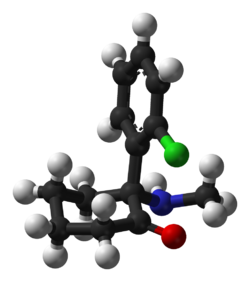Two nights in a row of bitch-slapping is excessive. But my anger at the leg and arm choppers from last night has been reignited this evening over the renewal of a memory I'd much much rather forget.
When Andrea Gianopoulos died in Mexico after her second ketamine coma treatment, I wrote rashly about it, and I hurt and angered her family. I cared, and their feelings and anger mattered, but so much was wrong with both the German wing (then suspended) and the Mexican wing of the ketamine coma "trials" that I cared more about getting the word out.
I just ran across another blogger's post from January 2012 that was written with the approval of Andrea's mom Leslie. It is to be noted that the blogger, Nancy Cotterman, had her attention drawn to Andrea's death by these words of Leslie's posted at my favorite place, Facebook {shudder}:
"My daughter died from the Ketamine coma treatment"
I don't want to reinvent the wheel, hurt the Gianopoulos family even more. I have the same intentions to which Ms. Cotterman lays claim:
Andrea, I hope that your story will cause people to stop and think about all of the risks before they make the decision to go to a foreign country with a less sophisticated health care system than that of the US. Again, I'm not saying that we shouldn't go. I'm saying that we all need to do our homework and know everything that we can about the treatment, the facility, the doctor, the risks, etc. before going to have the treatment. You need to weigh the quality of life that you currently have against the potential risks of the treatments. Ultimately it is your decision and it should be an informed decision.
Perhaps when Leslie and Gus are feeling stronger, they can join us in our fight to get all insurance companies... to cover Ketamine here in the US. Had Andrea's insurance company covered her outpatient follow up Ketamine after her trip to Germany PERHAPS (of course there is no way to be sure) it could have held her coma treatment. If, like Jon Haag, coma treatment were available here in the US PERHAPS (again there is no way to know because people die here in the US too) coma Ketamine would be safer. At least, we wouldn't have the expense of paying out of pocket, travel and treatment would be available to more people. The more a procedure is done, the safer it becomes.
There's no claim on my part or anyone's that the liaison folks in Tampa or the "trial" supervisors in Mexico did anything wrong.
There's loads of evidence that it is pure nonsense to call this activity a "clinical trial" or to claim that strict protocols are being observed. That's where the bitch-slap comes in... again.
Andrea had already had one coma treatment, in 2002. It failed to work, one supposes, because she had no access, financially, to the booster treatments that are supposed to be so crucial to the continued success of the coma. Huge,.freaking break in protocol, right there.
That she went on to get so much worse, I regret, and regretfully, understand. But what continues to freaking escape me is how, after heart surgery for a bad valve -- adding a significant comorbid condition -- she flies to the top of the list again for Germany. But those "clinical trials" having been shut down due to Laura Becket's MRSA and paralysis (which could have happened anywhere, to anyone), somehow Andrea again rose to the top of the list for Mexico.
There are doctors and administrators who have made a lot of money on this compassionate outreach, and that is why protocols matter, that is why a tragic story should not have put a young woman's life at risk, and that is, perhaps, why this needs to stop.
There is enough evidence now that ketamine helps some handpicked patients (only of Dr. Kirkpatrick? only of Dr. Schwartzman?) that the trials, properly set up, strictly supervised, and sufficiently cold-hearted to be fair in their provision of access need to be brought to the U.S.
People are told there is a two year wait to see these CRPS gurus -- and they are the disease wizards -- but if you happen to also be monied and all that goes with, my how those limits disappear, the other waiting lists for the coma trials magically shrink.
I know this is the way of the world. I bitch-slap the world, then.
My previous writing -- very raw -- about this topic can be found HERE. But not much has changed since I banged a different keyboard back in 2009:
How dare I intrude on the death of this lovely girl? Why can't I leave it -- her -- alone, in peace? In part, it is because of the evident lack.
There is nothing but silence around this death, hardly anything beyond the barest of acknowledgements.
Or the most private of them. The nearest and the dearest. And to them, I apologize -- no, rather I beg pardon, for this prurient interest -- not in Andrea, but in what happened *to* Andrea.
The ketamine coma trials... that is what we are made to say, you know -- "the trials."
How many other legitimate "trials" cost well over $50-60,000? How many other legitimate trials cost ANYTHING?
How many other legitimate "trials" suffer a death and allow it to pass into silence, unexplained?
There has also been a high incidence of infection, particularly respiratory -- aspiration pneumonias.
Oh, and how many "trials" make way for someone to repeat the treatment, the benefits of the first time around apparently not having lasted? How was that expressed in the data collection of the second coma? Was the first treatment before the days of the "trials"? You know, back when a person basically only had to produce the money, and be sufficiently young and healthy (beyond having CRPS)? Wait... am I getting it all confused? Because it sure seems like today's requirements are eerily... no, *exactly* the same -- young, otherwise healthy, cash in hand.
My prurient interest has its roots in anger and envy -- as well as in a more legitimate need for information that was not forthcoming from those running the programs.
I cannot forget Andrea. I cannot forgive the shortcuts that cut her short. I cannot believe it has been so successfully buried, the truth.







